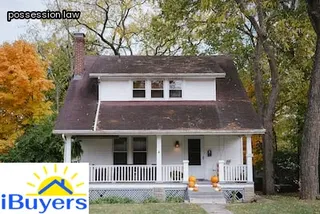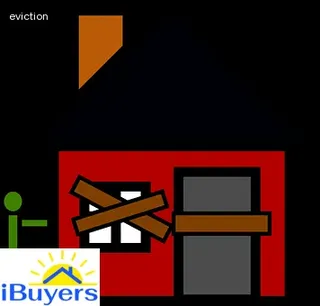In Illinois, squatters' rights are a form of legal possession over land or buildings by individuals who have occupied the land or building for an extended period of time without having any legal title to it. This practice is also known as “adverse possession” and can be used when a squatter has occupied the property for more than seven years.
In order to establish ownership, the squatter must prove that they have been in continuous possession of the property, that they possess it openly, and that they have paid all necessary taxes on the property. In addition, they must also demonstrate that they have made improvements to the land or building.
Once squatters have established ownership, they are then granted certain rights including access to utilities and the right to sell or lease the property. Real estate owners should understand these rights and be aware of them if they own property in Illinois, as failure to do so could result in potential disputes with squatters.

When attempting to understand squatter rights in Illinois, one of the most important considerations for real estate owners is determining color of title. This concept is based on whether or not a squatter has any legal right to the property that they are occupying.
To do this, owners must look at a few key elements: possession, pay of taxes, length of occupancy and payment of rent or improvement. Possession refers to whether or not a squatter has exclusive control over the property; if they are paying taxes on it, they have more rights than if they weren’t.
Length of occupancy indicates how long the squatter has been living on the property and can also be used as an indicator of their rights. In addition, payment of rent or improvement shows that the squatter is actively investing in the property and likely has some stake in it.
Understanding these elements will help real estate owners determine whether or not a squatter holds any legal claim to their land and provide them with essential information when making decisions about their property.
Squatters rights, sometimes referred to as adverse possession laws, are a set of legal principles in Illinois that allow individuals who occupy someone else's property without the owner's permission to gain legal title after a certain period of time. In other words, a squatter can become the rightful owner of the property they occupy by staying on the land for an extended period.
In order for this to occur, however, several conditions must be met: 1) The squatter must have exclusive use and possessory control of the property; 2) They must act openly and notoriously; 3) They must continuously possess it for an extended period (usually 20 years); 4) The possession must be hostile to the true owner’s rights; and 5) The squatter must pay all taxes levied against the property. If these conditions are satisfied and no one objects during that 20-year period, a court may grant ownership to the squatter.
It is important for real estate owners in Illinois to understand these laws in order to protect their rights and inform themselves about potential squatters who may try to claim ownership over their land.

When it comes to the eviction process in Illinois, real estate owners must be aware of squatter rights and when they can initiate the legal action. According to Illinois law, a tenant is legally allowed to stay on the property if they have been living in it for at least seven years without being formally evicted by the landlord.
A landlord can make an effort to evict a squatter by filing a complaint with their local court, however this must be done within seven years of them moving into the property. During this time, landlords may also need to prove that they have paid taxes and other fees associated with the property.
It is important for real estate owners to understand any local laws surrounding squatting as well as develop an appropriate protocol for tenants that are living on their property for an extended period of time without paying rent or being formally evicted.
For real estate owners, understanding and protecting your property from squatters is essential. When it comes to squatter rights in Illinois, the best way to protect your property is by being proactive and taking preventative measures.
Start by familiarizing yourself with the laws in your state—it's important to stay informed about the legal rights of squatters and the restrictions that apply to them. Additionally, be sure to check for any signs of occupation on your property, such as furniture or other belongings.
If you find anything that could indicate a squatter has taken up residence on your property, contact law enforcement immediately. You can also take steps such as securing entrances and exits with locks or fencing off areas of your property where squatters may enter.
Finally, make sure you have a written agreement with anyone who may be living on your land, detailing their rights and responsibilities as tenants. With these strategies in place, you can ensure that your property remains safe and secure against unlawful occupation by squatters.

Are you a real estate owner in Illinois looking to protect your portfolio from the risks of squatting? Downloading the right resources can help you understand your rights and responsibilities when it comes to protecting yourself from illegal occupation of your property.
A great place to start is by downloading a guide that explains squatters' rights in Illinois, such as the Essential Guide for Real Estate Owners, which provides detailed information on understanding state law and steps to take when faced with a squatter.
Additionally, there are free legal documents available for download that allow you to create a customized lease agreement, making sure you adhere to all relevant state regulations and protect yourself from potential liability.
Taking advantage of these free downloads is one way to put your real estate portfolio on the path towards security and success.
Landlords and property owners in Illinois know how difficult it can be to deal with squatters. When tenants don’t pay rent, or individuals illegally occupy a home, it can cost time and money for the real estate owner.
That’s why understanding squatter rights in Illinois is essential for anyone wishing to protect their investments. Knowing the strategies available to fight squatting will help landlords save time and make more money.
Having a comprehensive plan in place before any problems arise is key. Property owners should know their rights under Illinois law and have an experienced legal team at the ready if necessary.
They should also be aware of their obligations as landlords, such as providing notice to vacate when tenants fail to pay rent. Utilizing preventative measures like proper screening of tenants, set-up of tenant contracts, and regular maintenance checks are also valuable tools in stopping squatting before it starts.
By understanding squatter rights and implementing effective strategies, real estate owners can save time and make more money while protecting their investments against illegal occupancy.

Real estate owners across Illinois must understand the importance of being aware of their rights when it comes to handling squatter issues. Squatters have the ability to gain legal rights if certain criteria are met, leaving landlords at risk for complications.
Requesting a demo is a great way for property owners to gain more insight on how to handle squatter problems in accordance with the law and protect their investments. During the demo, real estate owners will learn more about the legal rights associated with squatting, as well as what they can do to prevent unwelcome squatters from taking over their properties.
They will also be provided with useful tips on how best to work with local authorities and legal counsel should they need assistance in evicting a squatter. With this knowledge in hand, property owners will feel empowered and confident when it comes to dealing with any potential squatting issues that may arise.
When signing up to potentially make an Adverse Possession Claim in Illinois, it is important to understand the terms and conditions that come with such a claim. The laws of this state dictate that the squatter must have been living on the property for at least 20 years before they can make a claim, and that there must be proof of continuous possession throughout that period.
Furthermore, the squatter must also demonstrate that their occupancy was hostile, open, notorious and exclusive - meaning that they should not have permission from the true owner or pay rent for living on the property. Additionally, when making a claim for adverse possession in Illinois there should be evidence of payment of taxes on the property during the entire occupation period.
It is also necessary to note that if a claimant fails to meet any one of these requirements then their Adverse Possession Claim may be denied by the court. Real estate owners should likewise keep in mind that if adverse possession proceedings are successful then they can lose title to their land without receiving any compensation from the squatter.
Consequently, understanding all relevant squatters' rights in Illinois is essential before signing up to potentially make an Adverse Possession Claim.

Squatters' rights are an important issue for real estate owners in Illinois. The reasons behind these rights vary, but often stem from a state's laws regarding adverse possession.
In Illinois, squatters may gain legal title to property if they occupy it for a certain period of time and fulfill certain requirements. Generally, the squatter must occupy the property openly and adversely to the true owner, pay taxes on it, and use it exclusively for their own benefit.
Additionally, the squatter is required to have held possession of the land in good faith while not knowing or having reason to believe that any other person holds title to it. Squatters who meet all of these criteria can then acquire legal title to the property after seven years of continuous occupation in Illinois.
It is important for real estate owners in Illinois to understand these rules and how they can be impacted by a squatter's rights claim.
When it comes to understanding squatter rights in Illinois, one of the most important considerations for real estate owners is investigating whether or not a squatter has to pay property taxes if they are attempting to claim adverse possession. In this state, the law states that in order for a squatter to establish an adverse possession claim, they must have been occupying the property continuously and without challenge from the rightful owner for a period of seven years.
This occupancy must also be open and notorious, meaning that it was obvious to anyone who happened by that the squatter was living on the property. Additionally, during this period of time, the squatter must be paying taxes on the land as if they were its rightful owner.
If these conditions are satisfied, then the squatter may have a valid claim to ownership under Illinois law.

In Illinois, the common law right of adverse possession allows a squatter to gain legal title over property they have been occupying without permission from the owner. The squatter must show that they have held exclusive possession of the property for at least 20 years, and also demonstrate continuous use during that period.
In addition, the squatter must show that their occupation of the property was visible, open and notorious; hostile to other claimants; and actual and exclusive. To do this, it is important for real estate owners in Illinois to understand squatters' rights under state law in order to protect their own interests.
Furthermore, it is essential for them to be aware of how long a squatter can stay on a property before they acquire legal title, as well as what type of evidence may be used in court proceedings if a dispute arises between an owner and a squatter.
In Illinois, a person must understand both statutory and common law when it comes to understanding squatter's rights. Statutory law is defined as any law that has been passed by legislators of the state while common law is determined by judicial decisions and rulings.
When it comes to the issue of squatters' rights in Illinois, there are two distinct types of laws to consider: those that provide detailed regulations governing squatter occupancy, such as the Illinois Rights of Possession Act; and those that provide general legal principles regarding possession, such as the doctrine of adverse possession. The former is based on statutes passed by the legislature while the latter relies on court decisions.
It is important for real estate owners in Illinois to be aware of both types of laws so that they can protect their interests from trespassers or unauthorized occupants. Knowing how statutory and common law intersect is essential for effectively managing properties with potential squatting issues.

In Illinois, the courts have established a framework for considering claims of adverse possession when it comes to understanding squatter rights. For a claim of adverse possession to be successful, the statute requires that the claimant must prove actual, open and notorious possession for a continuous period of 20 years or more.
The courts have declared that this period must be uninterrupted, exclusive and hostile with regard to the true owner's title. Furthermore, claimants must demonstrate their possession through visible lines such as fences or hedges and an intent to exclude others from use of the property.
They must also show that they have paid any taxes due on the property during their occupancy. Finally, claimants are not eligible to make an adverse possession claim if they received permission from the true owner or if they are in violation of zoning laws or other regulations.
All these elements must be met in order for a successful claim of adverse possession to be made in Illinois.
When it comes to understanding squatter rights in Illinois, it is important for real estate owners to know what evidence is required for an adverse possession claim. According to the state of Illinois, courts require proof of open and notorious use, exclusive possession and continuous use for a period of seven years before a squatter can establish title through adverse possession.
Open and notorious use means that the squatter's presence must be visible, obvious and well-known; exclusive possession requires that the squatter has sole occupancy rights; finally, continuous use entails that the occupancy is uninterrupted. To support these elements, real estate owners may need to present evidence such as tax records, photographs or other documents that demonstrate the squatters' activities and identify their length of residence on the property.
Additionally, verbal testimony from neighbors or other witnesses may be necessary to prove how long the squatter has occupied the premises. Real estate owners should consult with an attorney familiar with Illinois law in order to ensure they have all necessary evidence prior to filing an adverse possession claim.

When it comes to understanding the impact of trespassers and how it relates to squatting rights, Illinois law is quite clear. In order for a person to be considered a squatter and have any rights to the property in question, they must first meet certain criteria.
This includes living on the property without permission from the owner or legal tenant, having an intention of possessing the property as their own, and occupying it continuously for an extended period of time. It is important to note that these criteria must all be met before any squatter can claim rights under Illinois law.
Additionally, if a squatter fails to meet any one of these conditions, then they are not legally entitled to squat on the property in question and may be subject to eviction or other forms of legal action by the real estate owner. Therefore, it is essential for real estate owners in Illinois to understand the implications of trespassers and how it could relate to squatting rights.
Adverse possession is a legal doctrine that allows for the acquisition of property rights without the owner's consent. In Illinois, understanding squatters' rights is essential for real estate owners who may be at risk of an adverse possession claim.
To analyze legal instruments as evidence supporting an adverse possession claim in the state, it is important to consider specific elements such as color of title, continuous and exclusive possession, open and notorious occupation, payment of taxes, and other relevant factors. For example, if an individual openly occupies a piece of land for more than 20 years and pays taxes on it during that time period, they can potentially gain ownership rights under Illinois law.
Additionally, if an individual has a deed or other legal document that states they own a particular piece of property but cannot prove they had actual physical control over it for more than 20 years then they might not be able to establish their ownership rights through adverse possession. In conclusion, real estate owners should understand the intricacies of squatter's rights in order to protect themselves against potential claims in Illinois.

When making a claim of adverse possession in Illinois, it is important to understand the concept of implied or constructive notice. This means that before a squatter can make a valid claim of adverse possession, they must have had actual knowledge of the property's owner or have been aware at least as much as could reasonably be expected, through either direct observation or public records.
In other words, the squatter must demonstrate that they had some degree of understanding about who owned the property and the fact that they were not the rightful owners. An essential guide for real estate owners to understanding squatter rights in Illinois would include advice on how to assess implied or constructive notice when making a claim of adverse possession.
The determination of whether or not there was sufficient knowledge can be based on legal precedent as well as factors like whether there was visible fencing around the property, if written notices containing information about ownership were posted where visible, and if any attempts were made by the owner to contact the squatter directly.
Yes, you can evict a squatter in Illinois. Squatter’s rights in the state of Illinois are governed by the Forcible Entry and Detainer Act.
In order for a real estate owner to lawfully evict a squatter, they must first serve notice to the person living on their property that they are trespassing. If the squatter does not vacate within 10 days of receiving notice, the real estate owner may file an eviction complaint with the local court.
The court will then issue a summons to appear at a hearing where both parties present evidence and make arguments before a judge makes a decision regarding whether or not to evict. If it is determined that the squatter is indeed living on someone else’s property without permission, they will be ordered to leave immediately.
It is important for real estate owners to understand their rights and obligations under state law when dealing with squatters so that they can take necessary steps to remove them from their property as soon as possible.

The state of Illinois recently passed a new law that impacts the rights of squatters. This law, known as the Residential Property and Squatter Rights Act, grants certain rights to squatters, including the right to remain in a dwelling for up to seven years.
Under this law, property owners must take legal action within a certain time frame if they wish to remove a squatter from their property. The law also requires property owners to serve notice of eviction or other legal action before taking any further steps in removing a squatter.
Additionally, should a squatter successfully establish an occupancy period of seven or more years, they may acquire title to the property under adverse possession laws. This new law is an important step in protecting both the rights of real estate owners and those who occupy their properties without permission.
In Illinois, it can take anywhere from a few months to several years for someone to obtain squatters rights. The length of time depends on the individual's circumstances and the amount of time they have been living in the property they are trying to claim.
Generally, squatting must be done openly and notoriously (i., in plain view of the public), and must be done continuously for seven consecutive years or more in order to establish a legal claim to the property.
In some cases, a squatter may be able to prove their right to stay in a house after less than seven years if they have maintained all necessary records and other documents needed to prove their presence at the property. Additionally, it is important that real estate owners understand that while squatters may not own the property, they do have certain rights as occupants of the property including access to running water, electricity, and other basic necessities.
Squatting is a term used to describe the practice of occupying an abandoned or unoccupied space or building, usually residential, without the permission of the owner. In Illinois, squatters can gain legal rights to a property after a certain period of time.
This period is often referred to as "squatter's rights." While the specifics vary from state to state, in general, squatters can gain legal rights after living in a property for seven years.
In Illinois, this period is even shorter—a squatter can gain exclusive possession of real estate after just three years. After three years of continuous possession, the squatter has acquired title by adverse possession and can no longer be removed from the property.
It’s important for all real estate owners in Illinois to understand that when it comes to squatters rights, there is no grace period; they begin accruing as soon as someone takes up residence on their property without their knowledge or consent.
A: The process for evicting a squatter in Illinois using Hostile Possession involves providing the squatter with a Notice to Quit, followed by an Unlawful Detainer action and ultimately an Eviction Notice.
A: Tenancies are established in Illinois when a squatter enters a building and openly exercises control over the property, such as paying rent or making repairs, for at least seven years. This is known as Hostile Possession and is the process used to evict squatters in Illinois.
A: In Illinois, real estate owners have the right to evict squatters through Hostile Possession. This involves filing a lawsuit against the squatter and providing proof that they are occupying the property without permission. If successful, the court can issue an eviction order that requires the squatter to leave within seven days or face fines and/or jail time if they fail to comply.
A: In Illinois, when evicting a squatter using Hostile Possession, the property owner must take action to assert ownership of the property and make it clear that they have not abandoned the premises. This can be done by changing locks, posting no trespassing signs, or other measures. If the squatter does not leave after being informed of their eviction, the property owner can then file an unlawful detainer lawsuit with their local court.
A: In order to evict a squatter in Illinois using Hostile Possession, the property owner must serve the squatter with an eviction notice and then file and win a case in court. The court will grant a Writ of Possession to the property owner, which allows them to legally remove the squatter from their land.
A: In Illinois, a property owner or their legal representative can initiate an eviction process against a squatter through Hostile Possession by filing a complaint with the court, obtaining a judgment from the court and then hiring a property management company to physically remove the squatter from the rental property. This requires proving that the lessee has had exclusive possession of the premises for more than seven years without permission or payment of rent.